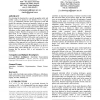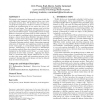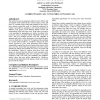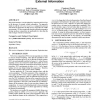125
Voted
WWW
2008
ACM
16 years 3 months ago
2008
ACM
For extracting the characteristics a specific geographic entity, and notably a place, we propose to use dynamic Extreme Tagging Systems in combination with the classic approach of...
126
click to vote
WWW
2008
ACM
16 years 3 months ago
2008
ACM
We present a computational framework to automatically discover high-order temporal social patterns from very noisy and sparse location data. We introduce the concept of social foo...
122
Voted
WWW
2008
ACM
16 years 3 months ago
2008
ACM
Geography is becoming increasingly important in web search. Search engines can often return better results to users by analyzing features such as user location or geographic terms...
134
click to vote
WWW
2008
ACM
16 years 3 months ago
2008
ACM
DNS is one of the most actively used distributed databases on earth, accessed by millions of people every day to transparently convert host names into IP addresses and vice versa....
150
click to vote
WWW
2008
ACM
16 years 3 months ago
2008
ACM
The web has become an important medium for news delivery and consumption. Fresh content about a variety of topics, events, and places is constantly being created and published on ...
WWW
2008
ACM
16 years 3 months ago
2008
ACM
RSS is the XML-based format for syndication of Web contents, and users aggregate RSS feeds with RSS feed aggregators. There are RSS aggregation policies that help aggregate RSS fe...
158
click to vote
WWW
2008
ACM
16 years 3 months ago
2008
ACM
This paper introduces a novel method for composing Web services in the presence of external volatile information. Our approach, which we call the informed-presumptive, is compared...
119
click to vote
WWW
2008
ACM
16 years 3 months ago
2008
ACM
Efficiently finding Web services on the Web is a challenging issue in service-oriented computing. Currently, UDDI is a standard for publishing and discovery of Web services, and U...
117
click to vote
WWW
2008
ACM
16 years 3 months ago
2008
ACM
This paper proposes an approach for solving the problem of composite process oriented service discovery with preserving business and timed relation. Key to our approach is the def...
124
click to vote
WWW
2008
ACM
16 years 3 months ago
2008
ACM
This paper provides initial analysis in identifying possible Web services composition using context-based semantic matching. Context-based semantic matching allows service composi...




